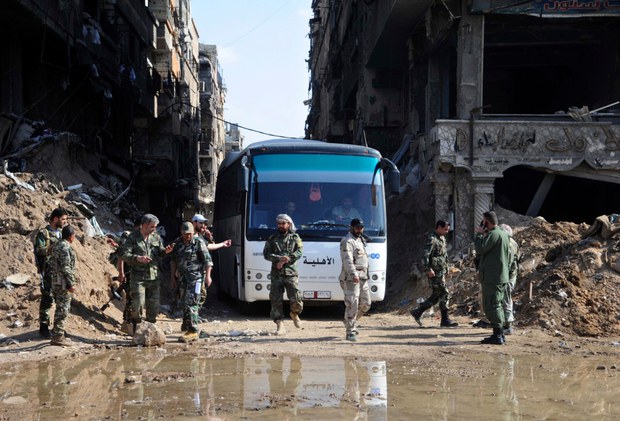Malaysian IS Fighters, Families in Syria Want to Return Home: Police Adviser
2018.06.14
Kuala Lumpur
 Government forces oversee a bus carrying al-Qaeda-linked fighters during an evacuation from a refugee camp in Yarmouk, near Damascus, Syria, April 30, 2018.
Government forces oversee a bus carrying al-Qaeda-linked fighters during an evacuation from a refugee camp in Yarmouk, near Damascus, Syria, April 30, 2018.
Dozens of Malaysians who went to Syria to join or fight for the Islamic State group are desperate to come home because of terrible living conditions and constant fear for their lives, according to a counter-terrorist expert and a senior police official.
After the fall of IS bastions in the Middle East, Malaysian IS fighters feared for themselves and their families who had joined them in Syria, Ahmad El-Muhammady, an adviser to the Royal Malaysia Police on rehabilitation programs for terrorist detainees, told BenarNews.
“The desire intensified after the fall of Mosul, Raqqa and Aleppo. The international NGOs did inform police but police were careful because of safety concerns,” Ahmad said. “Today the scenario is different. Many are dead and many foreign fighters have returned home, including Malaysians.”
He said he began hearing about such concerns in 2016, but the fear of being arrested made the fighters and their families seek refuge with NGOs in Turkey and Syria instead.
Ahmad said he did not know how many Malaysian fighters were left in Syria. Ayob Khan Mydin Pitchay, the chief of the Malaysian police’s counter-terrorist special branch, said more than four dozen remained in the country, but he could not break down the number of fighters to family members.
“But what I do know, they are living in a terrible conditions and want to come home. Not just because many IS bases have been defeated, but also because IS members who were caught in the war were killed and tortured,” Ahmad said.
He said he had seen photos of a group of Malaysian fighters who were detained in a rural village in Syria with limited food and water.
“They were not allowed to leave the village and they looked so malnourished,” he added.
Women are in Syria because they followed their husbands. “The women love and care about their husbands. That is why they abide with whatever the men say,” Ahmad said.
Ayob said a Malaysian woman had reached out in January to seek help in returning with her small children after her husband was killed in battle.
“She wished to return home and we are facilitating the case,” he told BenarNews.
Ayob declined to reveal the husband’s identity, saying this could affect the process of repatriating the widow and her family to Malaysia.
Of 11 families who traveled to Syria to join IS’s self-proclaimed caliphate, six have returned over the years after experiencing the reality of what they called a holy war, Ayob said. But among the remaining five families, half do not want to return home, according to an intelligence report.
The widow and children of Mohamad Wanndy Mohamad Jedi are among the five families, although officials could not determine if she wished to return to Malaysia. Wanndy, Malaysia’s most wanted terrorist, was killed in an air strike near Raqqa in April 2017.
He had claimed responsibility for a grenade attack at a nightclub on the outskirts of Kuala Lampur in June 2016, in which eight people were injured in the first and only terrorist act claimed by Islamic State on Malaysian soil.
The last Malaysian extremist to be killed in Syria, Muhammad Fudhail Omar, was Wanndy’s successor. He was killed in an air strike in Raqqa two months later.
Ayob said 53 Malaysians remained in Syria, including the five families, but said the breakdown on the number of fighters to family members was classified.
Since February 2013, the Special Branch Counter Terrorism division has arrested 310 suspected militants, including 21 Indonesian militants and says it has stopped 18 terror plots.
Strict rehabilitation necessary
Security analyst Aruna Dewi Gopinath said the Malaysian government is obligated to help secure the return of any citizens in Syria, but must establish a strict rehabilitation program.
“However we do not want to be like certain militants in the Philippines where they undergo rehab for a few months but later rejoin militant groups,” he told BenarNews.
“We must change their mindset. It may take years but that is the only way before we can let them join society.”
Ahmad agreed.
“From the security aspect, we can manage to gather valuable information from them when they return,” he said. “Of course there is a need for a rehab process and those who return must first be detained and they must undergo a strict monitoring process so they will not pose any threat to the public.”







